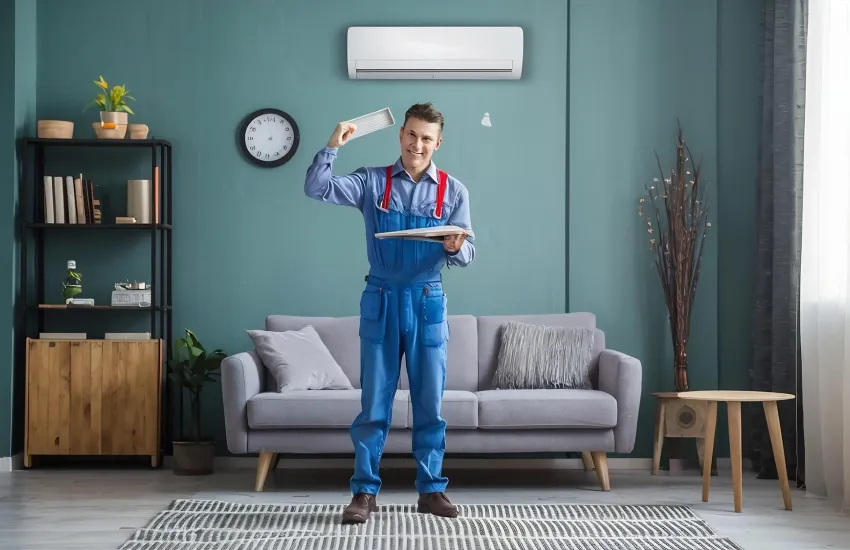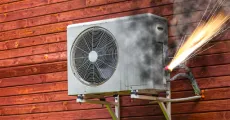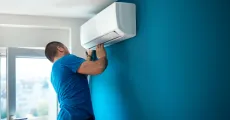Zap Those AC Woes: Master Guide to Air Conditioner | Electrical Troubleshooting

Air conditioner electrical issues can leave you hot under the collar. This comprehensive guide illuminates common problems, offers step-by-step troubleshooting tips, and advises when to seek professional help from CLT Appliance Repair. Learn to identify wiring woes, capacitor failures, and thermostat troubles, ensuring you stay cool when electrical gremlins strike your AC.
Zap Those AC Woes: Master Guide to Air Conditioner Electrical Troubleshooting
It’s a sweltering summer day, and suddenly, your air conditioner decides to give up on working. More often than not, the reason behind this is electrical in nature.
But why worry when we will be exploring all of the possible ways to fix it with you? So, read on for some important insights on the matter.
Your fridge is a kitchen superstar as it keeps all your food fresh and drinks cold.
But does the fridge feel warm when you open it?
Is there water all over the floor?
Fridge issues are the worst!
Common Electrical Culprits in Air Conditioners
- Frayed, corroded, or loose wires can throw a wrench in your AC’s operation.
- These little powerhouses store and release electrical charge. When they fail, your AC might struggle to start or run efficiently.
- Frequent tripping isn’t just annoying; it’s a cry for help from your overworked system.
- A faulty thermostat can leave your AC confused about when to chill out.
- The compressor of your AC system can fall victim to electrical issues, leading to overheating or failure to launch.
DIY Troubleshooting: Steps to Power Through
- Safety First: Always cut power to the AC before you start poking around. Safety glasses and insulated gloves are some things you should not avoid.
- Visual Inspection: Look for obvious signs of damage like burnt wires or bulging capacitors.
- Breaker Check: Is your circuit breaker throwing a fit? Reset it, but if it keeps tripping, there might be a bigger issue at play.
- Voltage Verification: Time to bust out the multimeter. Check voltage at key points to ensure your AC is getting the juice it needs.
- Capacitor Investigation: These cylindrical components should be smooth and unblemished. Any signs of bulging or leaking? That’s your cue for replacement.
- Wire Watch: Tighten loose connections and look for any signs of wire wear and tear.
- Thermostat Test: Ensure your thermostat isn’t sending mixed signals to your AC.


The Takeaway
Don’t let electrical issues leave you in a hot mess. With this guide and CLT Appliance Repair on speed dial, you’re well-equipped to tackle AC electrical problems head-on. Stay cool, troubleshoot wisely, and remember – when in doubt, call the CLT experts for air conditioner repair charlotte nc!
Don't let a malfunctioning Air conditioner disrupt your daily life. Contact CLT Appliance Repair today at 704-606-9043 to schedule your Air conditioner repair service.
We'll have your fridge back to optimal performance in no time!
- Air Conditioner Not Cooling
- Air Conditioner Leaking Water
- Air Conditioner Making Noise
- Air Conditioner Not Turning On
- Air Conditioner Frozen
- Air Conditioner Sensor Issues
- Air Conditioner Electrical Issues
- Air Conditioner Compressor Problems
- Air Conditioner Thermostat Issues
- Tips for maintaining an air conditioner.
FAQs
Frequent tripping can indicate an overloaded circuit, a short circuit, or a failing compressor. If it happens repeatedly, it’s time to call CLT Appliance Repair for a thorough inspection.
While it’s possible, capacitors store electrical charge even when the power is off. Unless you’re confident in your electrical skills, it’s safer to leave capacitor replacements to the pros at CLT Appliance Repair.
Annual maintenance is key. Schedule a yearly check-up with CLT Appliance Repair to ensure all electrical components are in top shape before the heat of summer hits.
Electrical buzzing could indicate a failing contractor, loose wiring, or a struggling compressor. Don’t ignore it – contact CLT Appliance Repair for a diagnosis before the problem escalates.
Absolutely! Storms, high humidity, and extreme temperatures can all impact your AC’s electrical components. Regular maintenance can help weatherproof your system against these challenges.
Appliance Repair Indian Land SC | Appliance Repair Indian Trail NC | Appliance Repair Pineville NC | Appliance Repair Rock Hill SC | Appliance Repair Belmont NC | Appliance Repair Matthews NC | Appliance Repair Lancaster SC | Appliance Repair Cornelius NC | Appliance Repair Fort Mill SC | Appliance Repair Concord NC | Appliance Repair Denver NC | Appliance Repair Monroe NC | Appliance Repair Mooresville NC | Appliance Repair Harrisburg NC | Appliance Repair Lake Wylie SC | Appliance Repair Huntersville NC | Appliance Repair Kannapolis NC | Appliance Repair Mint Hill NC | Appliance Repair Waxhaw NC | Appliance Repair Troutman NC | Appliance Repair Davidson NC | Appliance Repair Gastonia NC | Appliance Repair Charlotte NC

